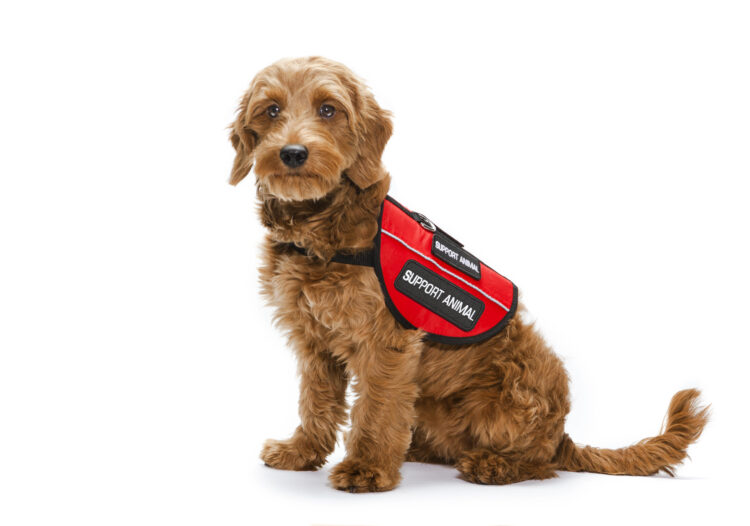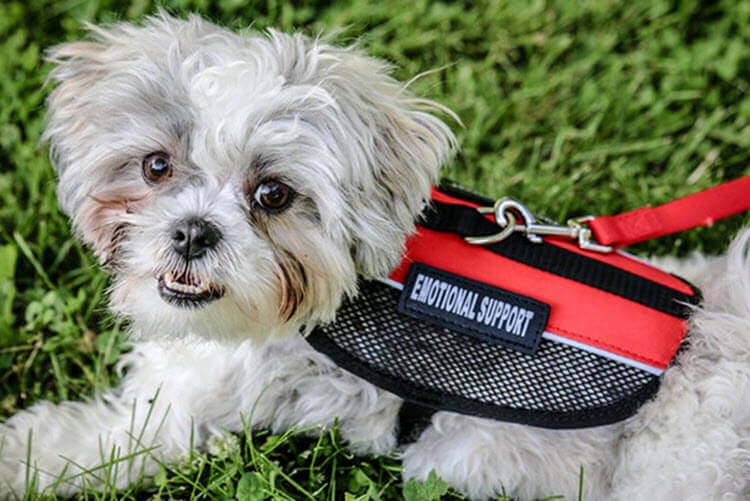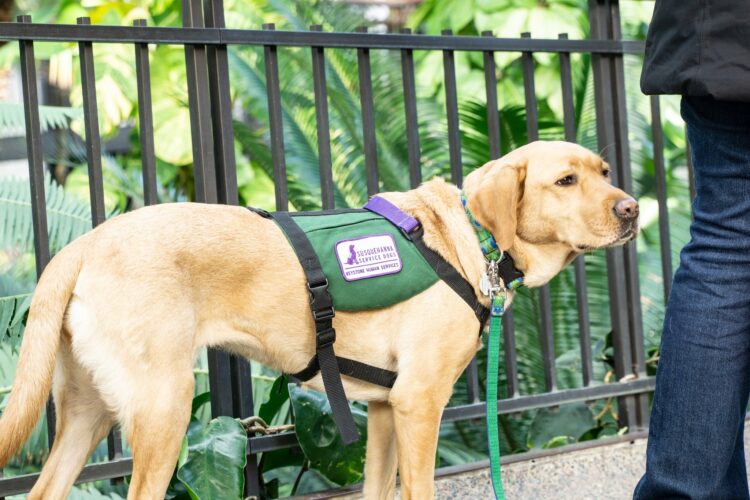Dogs make some of the best companions ever. As pets, they can make us laugh with their unique personalities, they are some of the best listeners in the world and they are loyal. These quality traits can be enhanced by training a dog to handle certain tasks including help with day-to-day errands and even life-saving skills.
Here, we will discuss the various types of service dogs, how they enrich people’s lives, what the qualifications are, and some of the ins and outs of the laws and registration process.
Types of Service Dogs and Their Roles

There are three primary types of assistance dogs including service dogs, emotional support and therapy dogs. Knowing the difference is important because the rights vary.
Service Dog
The Service Dog is trained to handle tasks that the owner is unable to perform on their own, such as assisting individuals with physical, visual, or mental impairments. With proper training, service dogs can also learn to detect health disorders like seizures and low blood sugar. In addition to improving the owner’s physical and mental well-being, a service dog is also capable of providing emotional support.
The training required for service dogs will vary depending on the tasks assigned. Such tasks may include:
- Opening doors for individuals confined to a wheelchair
- Alerting a deaf owner of specific sounds
- Offering guidance to a blind person
- Warning the handler of low blood sugar, anxiety attack, oncoming seizure, etc.
Emotional Support Dog

The ESA (emotional support dog) is trained to provide comfort, companionship, and emotional support to individuals suffering from mental illness, stress, anxiety, and so on.
Emotional dogs do not always receive specific training, rather they offer support to their owner. However, because they are allowed access to public areas such as pet restricted housing and airplanes, they should be trained in obedience. To qualify as an emotional support dog, a signed letter from a licensed therapist is required.
Therapy Dog
The Therapy Dog is able to provide comfort and can often be found accompanying individuals in retirement and nursing homes, hospice and hospitals, schools, or areas that induce stress such as courtrooms. Unlike the emotional support and service dogs, therapy dogs aid various people by their calming presence and deep affection.
While institutions and public places may have a therapy dog for the benefit of guests, patients, and/or students, they gain no rights of access to areas outside of the typical household pet.
Benefits of Service Dogs

Service dogs can help enrich the life of an individual in countless ways emotionally, physically and psychologically. Having a service dog can support your physical and mental disabilities in many ways. They can be used as a preventative measure for people with epilepsy and dysautonomia, provide stability for people with mobility issues, and perform several household tasks. Here’s a list of some of the top benefits of service dogs.
For emotional support (Stress and Anxiety Relief): Aids in calming individuals suffering from health issues. People living with social anxiety, speech problem, and PTSD can benefit from a service dog as well. Because service dogs can be very in tune with emotions, they can relieve anxiety, soothe panic attacks, and make stressful daily activities easier for those with debilitating mental disorders.
Improves Communication and Socialization: In addition to the companionship of a service dog and your dog’s ability to assist in certain tasks, a service dog can enhance the owner’s willingness to interact with others in public scenarios.
Aids with Self Confidence: The combination of emotional support and assistance in the home and in public places, the owner often experiences a renewed sense of independence and empowerment. This is especially true for people in wheelchairs, or with visual, auditory, or speech disabilities
For mobility assistance: A service dog can help its owners get around easier. For someone utilizing a wheelchair, their service dog can help them go up ramps and onto sidewalks, help them get in and out of the chair, and help them retrieve items that have fallen or that are difficult to reach.
For epilepsy: Did you know that dogs can be trained to detect seizures? People living with epilepsy can benefit from a dog trained to detect seizures because it will allow them to get to a safe place before the episode starts.
For sight and hearing assistance: For daily activities, a service dog can drastically improve the quality of life for a person who needs hearing or sight assistance. Service dogs can help them get around in public with ease, safety, and confidence.
For invisible illnesses: Many disorders and illnesses are not readily seen by strangers, such as autism, depression, bipolar disorder, panic attacks, chronic fatigue and more. The quality of life of a person with any of these disorders can be greatly improved with a service dog via emotional support or by assisting with daily physical tasks that they struggle with.
How to Navigate Service Dog Registration

Service dogs offer benefits for many different life situations and applications. Based on the type of service dog and situation in which your dog is helping, there are many different regulations and requirements. Hence, it is important that you understand and adhere to the laws and policies applicable to the dog’s purpose.
USA Service Dogs is available to help you understand and navigate the laws as well as the service dog registration process, so you can ensure your full rights are upheld. They provide service dog and emotional support registration kits with ID cards, certificates, equipment for your dogs like vests, collars and leashes.
In most cases, businesses such as hotels and airlines may ask to see some form of identification indicating that the dog is a service dog. ADA law gives owners of service dogs the right to be with you in airlines, housing, hotels, and public places regardless of their pet policy. However, if your disability isn’t immediately apparent, it may be the difficult convincing authority to allow your dog to remain by you. Therefore, it is helpful to have equipment for your dog and identification for recognition to avoid hassles and questioning.
 Hi Boox Popular Magazine 2024
Hi Boox Popular Magazine 2024



